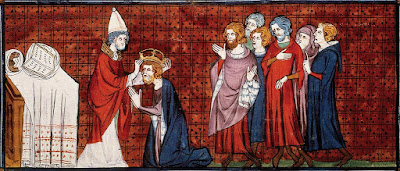Schoolchildren learning about the history of Western Civilization all hear the story of how Charlemagne was in Rome on Christmas Day in 800, and while at mass the pope placed the crown of the Holy Roman Emperors on his head, at once elevating him to the highest temporal position in Europe and implying that the pope had power to choose and make the emperor. (Actually, the pope owed Charlemagne a favor: the people of Rome disliked him and tried to torture him, and Leo III fled to Charlemagne, asking for support. Charlemagne traveled with Leo back to Rome in November of 800 and restored him to his papal throne.)
The 25th of December was an easy day to remember, and some rulers after Charlemagne used it as the official start to their reigns.
In 1066, William the Conqueror of Normandy was crowned King of England in Westminster Abbey in London, having waited well over a month since defeating his enemies and establishing his rule.
Baldwin of Boulogne (c.1058-1118), one of the leaders of the First Crusade, was chosen to rule Jerusalem after the death of his brother, Godfrey of Bouillon. Godfrey refused the title "King," believing it was inappropriate for anyone other than Jesus Christ to be styled "king" of Jerusalem. Godfrey died in July 1100. Baldwin had no trouble either calling himself "King of Jerusalem" or driving the lesson home by being crowned in Jerusalem on the day celebrating Christ's birth.
| Baldwin takes the crown of Jerusalem |
Christmas Day is a day we associate with gifts. For some people in history, Christmas "gifts" were on a much grander scale than a pair of socks.

No comments:
Post a Comment
Note: Only a member of this blog may post a comment.